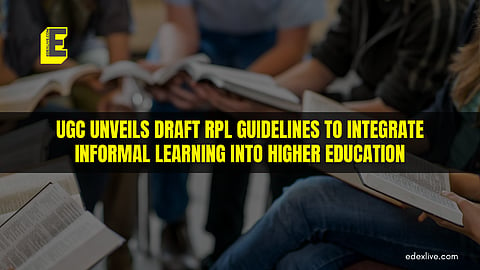UGC unveils draft RPL guidelines to integrate informal learning into higher education
The University Grants Commission (UGC) has released the Draft Guidelines for the Implementation of Recognition of Prior Learning (RPL) in Higher Education to make higher education more flexible, accessible, and supportive of continuous learning.
According to a report by the Education Times, the guidelines aim to provide necessary resources and advanced tools for effective assessments.
What is the RPL?
- RPL is a formal process that evaluates a person’s existing knowledge, skills, and experience gained through formal, non-formal, or informal learning.
- The competencies (knowledge, skills, and abilities) gained informally or non-formally are often not formally recognised or certified.
- RPL will play a crucial role in integrating informal and non-formal learning into the formal education system through the elaborate process of RPL subject to assessment.
- It allows individuals to formalise their competencies (knowledge, skills, and abilities) and earn credits through a well-defined framework.
Application of RPL
An example of RPL’s application is shown through Asha, a nurse with a Diploma in General Nursing and Midwifery (GNM), who seeks to upgrade to a Bachelor of Science (BSc) Nursing degree. Asha would submit her credentials, and an assessment body would evaluate her prior learning and professional experience. She would undergo written and practical assessments to demonstrate her competencies, and based on her qualifications.
"Here is how her journey to a BSc degree will unfold: She will have to submit her GNM diploma, detailed transcripts, course descriptions, and a letter from her employer outlining her roles, responsibilities, and professional competencies developed during her three years of experience in a large hospital. Following this an assessment body, in collaboration with an awarding body in the nursing sector, will evaluate Asha’s educational background and professional experience. They will compare the curriculum of her GNM programme with the courses offered in the BSc Nursing programme, focusing on nursing-related subjects. She will have to demonstrate her competency in nursing and undergo written assessments and practical examinations at the RPL Assessment Centre. The assessment body will determine the equivalence of Asha’s GNM curriculum with the BSc Nursing programme. With the credits awarded through RPL, Asha can be exempted from certain courses in the BSc Nursing programme. This recognition will shorten the duration of her study and reduce her educational expenses.”
Eligibility
Eligibility for RPL includes prior learning experience, language proficiency, competence, and authentic evidence. RPL aims to improve employability by providing formal recognition of skills gained outside traditional education, facilitating access to higher education and qualifications. The National Credit Framework (NCrF) will help formalise academic, vocational, and experiential learning.
Employability
RPL can also save costs by reducing training expenses for employers, particularly in industries like arts, nursing, and paramedics. It enables working professionals and individuals who have paused their formal education to leverage their experience and advance their careers.
However, implementing RPL may face challenges, such as the complexity of evaluating prior learning and the need for significant institutional resources. The framework’s international application could also be difficult, as credit recognition varies across national systems. Additionally, there may be challenges in building capacity among educators and assessors.



